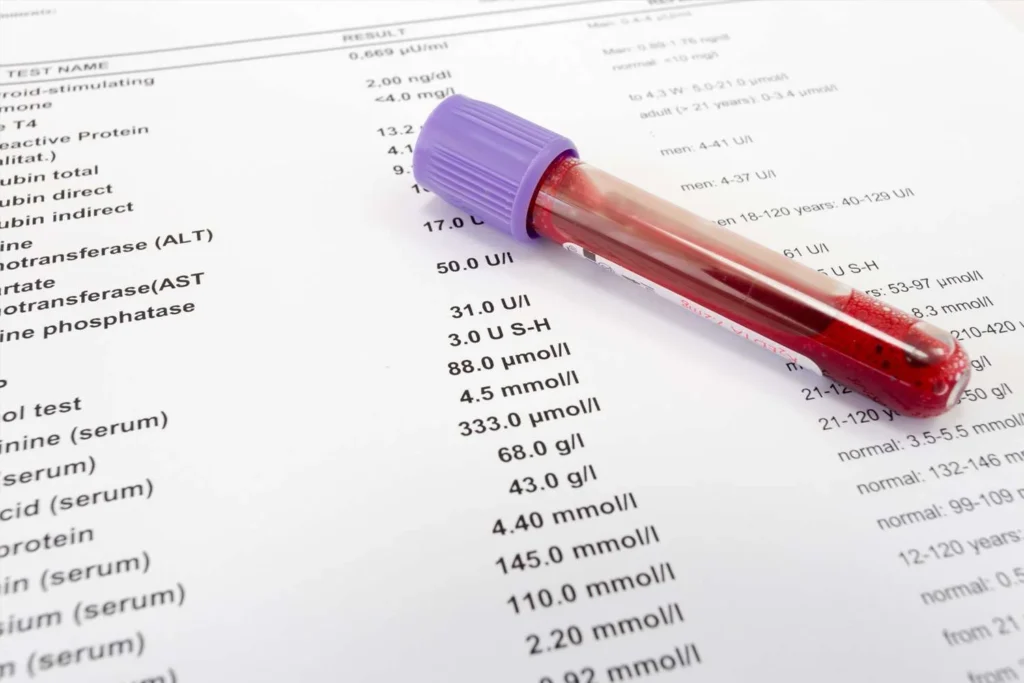
Blood tests are one of the simplest and most powerful tools doctors use to monitor your health. They can help detect illness early, track how your body is functioning, and guide treatment. But when the results arrive, the numbers and medical terms can feel confusing.
This guide breaks things down so you can better understand what your blood test means – and what to ask your doctor.
The Basics of Blood Tests
Blood tests give doctors important information about how your body is working. Some of the most common include:
- Full Blood Count (FBC) – Measures red blood cells, white blood cells and platelets. Helps identify conditions like anaemia or infection.
- Lipid Profile – Checks cholesterol and fats in the blood, giving insight into heart and circulation health.
- Liver Function Tests – Show how well your liver is working by measuring proteins, enzymes and bilirubin.
- Thyroid Function Tests – Assess whether your thyroid gland is underactive or overactive.
- Renal (Kidney) Function Tests – Measure markers such as urea, creatinine and estimated glomerular filtration rate (eGFR). These results show how effectively your kidneys are filtering waste products and maintaining fluid balance.
- Testosterone Test – Measures levels of the key male hormone that influences energy, muscle mass, mood and sexual health. Abnormal levels can point to hormonal imbalance, low testosterone, or other endocrine conditions.
Each test focuses on a different system in the body, together building a picture of your overall health.
Making Sense of Your Report
When you receive a blood test report, you’ll see results alongside a “normal range.” Here are some key markers:
- Haemoglobin – The oxygen-carrying protein in red blood cells.
- Men: usually 13.8–17.2 g/dL
- Women: usually 12.1–15.1 g/dL
- White Blood Cells (WBC) – Fight infection.
- Normal range: 4,500–11,000 cells per microlitre
- Platelets – Help blood clot.
- Normal range: 150,000–450,000 per microlitre
- Cholesterol – Includes “bad” LDL and “good” HDL cholesterol.
- The right balance depends on your individual risk factors
- Kidney Markers (Renal Function)
- Creatinine – Reflects kidney filtration. Higher levels may suggest impaired kidney function.
- Urea – Another marker of kidney performance, though also influenced by diet and hydration.
- eGFR – A calculated estimate of how well your kidneys are filtering blood. A reduced eGFR may indicate chronic kidney disease.
When Results Fall Outside the Range
An abnormal result doesn’t always mean something serious, but it’s a sign to look closer. For example:
- High WBC count – May indicate infection or inflammation
- Low haemoglobin – Can suggest anaemia
- High LDL cholesterol – Increases risk of heart disease
- Reduced eGFR or high creatinine – May suggest kidney disease or reduced kidney function
Your doctor will interpret these results in the context of your symptoms, medical history and any other tests.
Talking to Your Doctor
To get the most from your consultation:
✔ Write down your questions in advance
✔ Ask about what any abnormalities mean for you
✔ Discuss next steps – whether that’s treatment, lifestyle changes or further testing
Regular blood tests are one of the best ways to spot health issues early and take proactive steps to stay well.
Take Control of Your Health
Understanding your blood test results gives you the confidence to make informed choices. At OneMedicine in Edgbaston, our doctors provide fast, comprehensive health screens with clear explanations – so you don’t just get numbers, you get answers.
If you’d like to book a consultation or a full health check, our team is here to help.
















